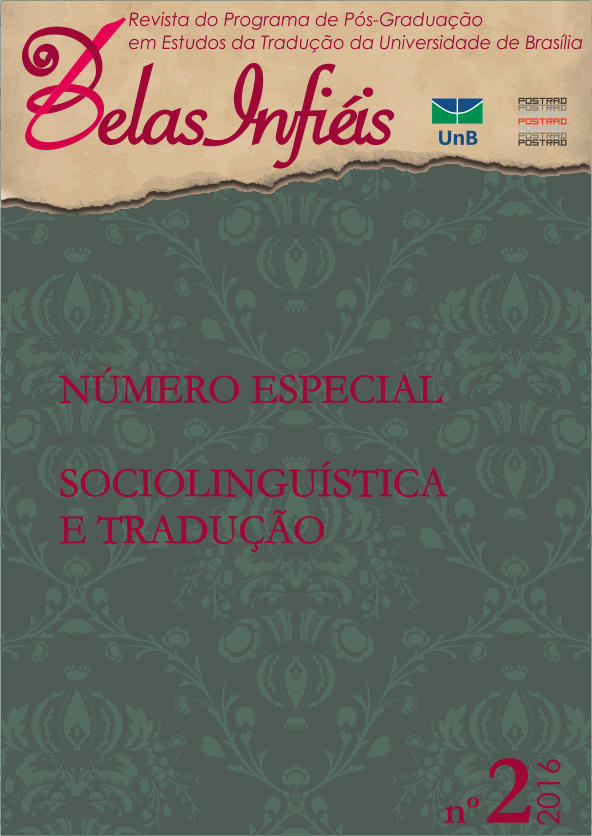A TRADUÇÃO E A FORMAÇÃO DE IDENTIDADES CULTURAIS:
UMA CONTRIBUIÇÃO BRASILEIRA AOS OBJETIVOS DO DESENVOLVIMENTO DO MILÊNIO - ACABAR COM A FOME E A MISÉRIA
DOI:
https://doi.org/10.26512/belasinfieis.v5.n2.2016.11385Palabras clave:
tradução institucional, Presidência da República Federativa do Brasil, identidades culturais, domesticação, Lawrence VenutiResumen
Este artigo examina a influência da tradução na formação de identidades culturais, conforme texto de Lawrence Venuti, no qual ele explica o processo da tradução e seus efeitos, a representação de culturas estrangeiras e a criação de sujeitos domésticos, bem como argumenta sobre a ética da tradução, sob a perspectiva do etnocentrismo. Com base nos ensinamentos de Venuti, apresenta-se o exemplo da influência de alguns textos brasileiros na terminologia internacional referente ao primeiro dos oito Objetivos de Desenvolvimento do Milênio - “acabar com a fome e a miséria”. A ênfase do artigo está, principalmente, na influência que a tradução pode exercer sobre identidades coletivas quando é autorizada e sustentada por instituições. Ademais, constata-se, sob perspectiva contrastiva ao texto de Venuti, que na Presidência da República Federativa do Brasil o tradutor não escolhe os textos a traduzir e as traduções publicadas pela instituição não mencionam sua autoria.
Referencias
ARISTOTLE. The Poetics. TraduçãodeIngramBywater. Oxford, 1920.parte 1.Disponível em: <https://en.wikisource.org/wiki/Poetics_(Bywater)/1>. Acesso em:18ago.2015.
EXPO MILANO 2015. The Zero Hunger Challenge: united for a sustainable world. The United Nations, 2015. Disponível em <http://www.expo2015.org/en/the-united-nations>. Acesso em: 18ago. 2015.
FOWLER, Edward. Rendering words, traversing cultures: on the art and politics of translating modern japanese fiction.Journal of Japanese Studies, vol. 18, n.1,p. 1-44, 1992.Disponível em: <http://isites.harvard.edu/fs/docs/icb.topic84305.files/Required_Readings/fowler.pdf>. Acesso em: 18ago. 2015.
JONES,John. On Aristotle and Greek Tragedy. Stanford: Stanford University Press, 1980. p. 19-20.Disponível em <https://books.google.com.br/books/about/On_Aristotle_and_Greek_Tragedy.html?id=uTesAAAAIAAJ&redir_esc=y>. Acesso em:18ago.2015.
ODM Brasil. Os Objetivos de Desenvolvimento do Milênio. 2000. Disponível em: <http://www.odmbrasil.gov.br/os-objetivos-de-desenvolvimento-do-milenio>. Acesso em: 18ago. 2015.
PROJETO FOME ZERO: UMA PROPOSTA DE POLÃTICA DE SEGURANÇA ALIMENTAR PARA O BRASIL. Instituto Cidadania, out. 2001. Disponível em: <http://www1.uol.com.br/fernandorodrigues/011017/doc_sintese.pdf>. Acessoem: 18ago. 2015.
SILVA, Luiz Inácio Lula da. Discurso na abertura da 58ª Assembleia Geral das Nações Unidas. Nova Iorque, 2003a. Disponível em <http://www.biblioteca.presidencia.gov.br/ex-presidentes/luiz-inacio-lula-da-silva/discursos/1o-mandato/pdfs-2003/2o-semestre/23-09-2003-discurso-do-presidente-da-republica-luiz-inacio-lula-da-silva-na-abertura-da-58a-assembleia-geral-da-onu/view>. Acesso em: 18ago. 2015.
______. Discurso no XXXIII Fórum Econômico Mundial. Davos, 2003b. Disponível em: <http://www.biblioteca.presidencia.gov.br/ex-presidentes/luiz-inacio-lula-da-silva/discursos/1o-mandato/pdfs-2003/1o-semestre/26-01-2003-discurso-do-presidente-da-republica-luiz-inacio-lula-da-silva-no-xxxiii-forum-economico-mundial/view>. Acesso em: 18ago. 2015.
VENUTI, L. A tradução e a formação de identidades culturais. Tradução de Lenita R. Esteves. In: SIGNORINI, Inês (org.). Língua(gem) e identidade. Campinas: Mercado de Letras, 1998a. cap. 3, p.173-200.
______. The Scandals of Translation: towards anethics of difference. London: Routledge, 1998b. cap. 4, p. 69-70
Descargas
Publicado
Número
Sección
Licencia
Copyright Statement
Given the public access to this journal, the texts are free to use but requires the recognition of the original authorship and initial publication in this journal to be properly stated.
The journal allows the use of works published for non-commercial purposes, including the right to submit the work to publicly accessible databases. Published contributions are the sole and exclusive responsibility of the author(s).
- When submitting papers to be evaluated by the Belas Infiéis journal, the author(s):
- Declare that the contents of the contributions are original and of their original creation, being entirely responsible for their content if there is an objection by third parties.
- Claim to be aware that they should not commit academic plagiarism.
- Declare that the manuscript has not been published, completely or partially, in Portuguese or another language. If it is a translation it should be submitted to the Translated Articles section.
- Declare that the manuscript is not being evaluated by other journals.
- Declare that the manuscript was not submitted to another journal simultaneously.
- Commit(s) to inform the journal of any kind of error or inaccuracy in their contribution (published, in evaluation or in editing) and to collaborate with the editors to make due corrections of the article (when in evaluation or editing) or erratum/retraction (after publication).
- Declare that there is no conflict of interest regarding the published work.
- Authorize its release if it is accepted for publication without any kind of monetary compensation.
- Agree to assign non-exclusive rights to publication to the magazine, remaining free to make their contribution available in other media as long as the publication of the first version in Belas Infiéis magazine is mentioned. They also authorize Belas Infiéis to assign their texts for reproduction in content indexers, virtual libraries and similar platforms.
- Maintain copyright and grant the journal the right of first publication, the work being licensed under theCreative Commons Attribution License.
- Is/Are allowed and encouraged to publish and distribute their work online after the editorial process, which may increase the impact and citation of the published work.
- Authorize the editorial team to make textual adjustments and to adapt the article to the publication rules, when necessary.



















